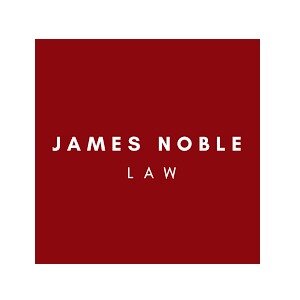

James Noble Law
Milton, Australia
James Noble - Accredited Family Law Specialist
James Noble is an Accredited Family Law Specialist with more than 40 years experience as a solicitor practicing in family law. He is a member of the Family Law Practitioner’s Association, The Queensland Law Society, The Family Law Council of Australia, Queensland Collaborative Law and the Family Law section of the Law Council of Australia, James is a Notary Public.
Establishing James Noble Family Law
James was a partner in a national law firm before establishing James Noble Family Law in 2003. In 2017, he joined his son Charles Noble in the practice James Noble Law. He aims to provide specialist family law and relationship law advice that emphasises amicable and timely resolution of relationship difficulties through negotiation, collaboration and mediation.
James is a qualified and experienced mediator. James has also been instrumental in developing Collaborative Law in Brisbane. He is a member of Queensland Collaborative Law which is at the forefront of developing this new approach in Family Law. He is a member of the International Academy of Collaborative Professionals.
James was born and raised in Brisbane and studied law at the University of Queensland. James has worked in law firms here in Brisbane and has also been involved in the wider community and is currently a member of Brisbane South Bank, James is a Notary Public.
In 1975 the Family Law Act was passed. James has practised solely in the area of family law, became an Accredited Family Law Specialist and became a Partner heading the Family Law Section of a national law firm.
In 2003 James established his own family law practice. He is an experienced family law litigator and has conducted many cases in the Family Court and the Superior Appeals Court. James’ approach to family law is calming and reassuring and his wealth of experience assists clients to navigate through difficult times.
With his considerable knowledge, he aims to provide specialist family and relationship law advice that emphasises an amicable and timely resolution of family law matters.
James has been instrumental in developing Collaborative Law in Brisbane and is a member of Queensland Collaborative Law and is also a member of the International Academy of Collaborative Professionals.
WHAT IS AN ACCREDITED FAMILY LAW SPECIALIST, AND WHAT DOES IT MEAN FOR YOU?
In addition to the many years of intensive study and testing required to become a solicitor with the qualifications to practice law in Australia, James Noble is also an Accredited Family Law Specialist. To gain this qualification James has undergone extensive further assessment and examination by the Queensland law society in the area of Family Law.
This assessment is carried out to ensure that solicitors who are awarded specialist accreditation have an advanced level of skill, knowledge and expertise in a very specific area of law. To maintain his status as an Accredited Family Law Specialist, James is also required to continue his education and activity within the area of Family Law.
You can be sure you are getting the very highest level of service, knowledge and expert legal representation in the area of Family Law when you work with James and the professional team at James Noble Law Brisbane on 1800 662 535.
Free • Anonymous • Expert Lawyers
Need Personal Legal Help?
Connect with experienced lawyers in your area for personalized advice on your specific situation.
No obligation to hire. 100% free service.
Practice areas
Dangers of Social Media
The rise of social media is impacting various areas of law, particularly family law proceedings. While sharing a social media post may seem harmless, a recent Family Law Review found that 81% of cases accepted social media evidence. There is no denying that an impulsive post can seriously affect the outcome of your matter.
What Type of Social Media Evidence is Used?
Family law matters may use the following types of social media evidence:
- Posts that are derogatory to the other party;
- Posts that evidence explicit behavior, such as using drugs or drinking excessively;
- Posts or screenshots of private messages which are relevant to the assertion that family violence has occurred;
- Posts on holidays or purchasing expensive items, proving the actual financial position of the party; and
- Posts or screenshots of private messages suggesting the party has contravened a court order.
So, how might this apply to a real-life example? In Reiby & Meadowbank [2013] FCCA 2040, the father’s bad behavior with drugs and alcohol presented in his social media posts was used as proof of his unsuitability to the parent. The mother in Edwards & Granger and Anor [2013] FamCA 918 was fearful of the father, presenting evidence of repeated threats to her life on Facebook. These scenarios prove that acting irresponsibly or violently will undoubtedly be used as evidence.
Does the Law Apply to Social Media?
Section 121 of the Family Law Act 1975 expressly prohibits parties from posting any part of a family law proceeding on social media. This includes any post which identifies:
- A party to the proceedings;
- A party who is related to a party to the proceedings; or
- A witness to the proceedings.
In addition to adversely affecting the outcome of your matter, breaching this law carries a penalty of 12 months imprisonment.
Can You Protect Yourself?
Change Your Passwords
It is important to ensure that your ex-partner does not have access to your social media accounts. To be safe, it is recommended that you reset any passwords.
Think Before You Click
You should always make social media posts with the assumption that they will be reviewed by the court. Ensure that your posts are always appropriate and tasteful. Avoid sharing any information about your ex-partner and avoid sharing posts that overly display your lifestyle. It may be a good idea to ask your friends and family members to avoid tagging you in any social media posts.
Avoid Deleting Posts
It is no surprise that nothing can actually be deleted off the internet. Before deleting a post, consider the possibility that a family member or friend may have already sent it to your ex-partner. Tampering with evidence is a serious offense.
How Can You Speak to a Lawyer?

The team at James Noble Law is experienced in the impact social media can have on family law disputes. If you are concerned about what evidence could be used against you, contact Brisbane family lawyers team to book a free consultation today. No-obligation 20-minute consultation. To schedule an appointment with one of our Qualified and experienced and Best Family lawyers Brisbane.
Find Brisbane family lawyers on Google Maps near you.
You may also like to know more information about the
- Are you at risk of family violence?
- Notice of Child Abuse, Family Violence, or Risk in Parenting Proceedings.
- Sex, Lies & Family Violence, Consider Your Options Today.
- Breaching Domestic Violence.
- Mother withholding child from father Australia.
- Separated and Living Under One Roof?
- A Guide to Separation in Family Law Download.
- Learn about Family court portal.
- Online Divorce application In Australia.
- Divorce property settlement examples Australia.
- Family Law act 1975.
- Parental Responsibilities and Legislation.
Need help with a legal matter?
Reach out to our team for expert legal guidance tailored to your situation.
Our Partners and Associates

About Charles Noble
Charles Noble is a qualified and experienced Brisbane lawyer with a focus on family law. He knows that in many family law and other matters, emotional and personal aspects of your lives are something you may wish to keep private. He understands this and prides himself as of the most discrete Family Lawyers Brisbane has to offer.
Charles was born in Melbourne but raised in Brisbane. Whilst he has travelled and spent time living overseas he has always called Brisbane home and is now raising his family here with his wife, Kristin.
Charles’ passion is Family Law and after graduating from QUT Law school has focussed his legal skills on Family Law in Brisbane.
Charles prefers a focus on alternative dispute resolution in order to do what can be done to keep our clients out of Court and keep their costs down. While Charles is equipped to take your matter to litigation if need be, his focus is on Mediation, Collaborative Law and using negotiating skills to achieve the best outcomes for our clients at James Noble Law Brisbane.
Charles has found that working with James Noble, who is one of the most experienced and professional Family Lawyers in Australia, allows him access to the very best advice for you in your Family Law matter.
Professional Focus
Charles is expert at negiation and mediation and has a thorough understanding of the family law process.
Proeprty Dispute Cases
85%
Children's Law Cases
95%
Family Law Cases
85%
Mediation Cases
78%
Divorce Cases
92%
Case results
Collaborative Law in Australia
Collaborative Law
Read moreSince its emergence in 1990, the collaborative practice has been a rapidly growing family law practice throughout America, Canada, Europe, England and now Australia.
On 1 January 1990 Stuart Webb, a Family Lawyer in Minneapolis in the United States decided that he would henceforth represent his clients only pursuant to a binding agreement that neither he nor the lawyers for the other party would ever go to Court for their clients.
His sole purpose was to ensure that his client and his client’s partner were able to reach an efficient respectful and interest-based resolution on matters resulting from a breakdown in the clients’ relationship. Stuart Webb realized that he needed like-minded family lawyers to practice family law in this manner.
What is Collaborative Practice in family law QLD?

Collaborative law, also known as collaborative practice. Collaborative practice has now established itself as a prominent means of resolving family law disputes.
The core element of collaborative practice is that lawyers and their clients will not threaten to resort to or engage in litigation during the period of their collaborative negotiations and all negotiations are to take place outside the Court system.
Ag a result of Stuart Webb’s endeavors the International Academy of Collaborative Professionals was formed and includes membership of family law practitioners, psychologists, communications professionals, financial planners, and accountants.
Details of the International Academy of Collaborative Professionals and a list of members are available on their website.
The core element that distinguishes collaborative practice from other areas of family law practice is the binding collaborative agreement (referred to as a “Participation Agreement”) which prohibits the lawyers and their clients from participating in contested court proceedings during the period of the collaborative negotiations.
Litigated resolutions
Relationship, Marriage Breakdown

Nearly half of all marriages in Australia end in divorce. A marriage of 7 years in the eyes of the Family Court is a lengthy marriage. The average marriage in Australia is 11 years. The breakdown in de facto and same-sex relationships (although statistics are not readily available) would be in the view of the author greater than the breakdown in marriages.
Divorced parents, remarriages, blended families, shared custody in one form or another with the potential for parental disagreement and conflict constitute the daily life experience of a large and growing percentage of children growing up in Western cultures today.
The divorce passage is far from easy for most people. In many cases, the emotional trauma of a breakdown in a relationship is only second to that of the death of a loved member or spouse. The grief and recovery process resulting from a breakdown in a relationship parallels the stages of recovery from the death of a loved one.
Divorce requires unusual emotional resources from parties at a time when they typically are experiencing high levels of stress and lowered coping ability. Moreover, clients are expected to make financial and parenting decisions of enormous import for the future wellbeing of themselves, their family and their children at a time when strong emotions often impair their ability to make sound judgments.

Study after study has documented the substantial harm inflicted on children by high conflict divorces in which parents use the Courts as a battleground for seeking redress for deep emotional pain which the Courts cannot possibly remedy.
This is a common experience of the author in the conduct of his family law practice. Courts, even with the best intention Judges, are poorly adapted to meet the needs of families as they break down and restructure.
The Family Law Courts fall far short of including the kinds of comprehensive conflict resolution, financial and psychological services that families involved in a relationship breakdown typically require. The Courts function in an adversarial model.
Most litigants emerge from a settlement in the Family Court disillusioned with the process. They tend to believe what has been set out in their Court statements (affidavits) when in reality they are awarded something that is far less than what they had hoped for. Unhappy clients are commonplace in family law litigation. The fees and costs incurred in family law litigation are in most cases well beyond the financial means of a client.
Nearly all litigated proceedings which mainly deal with parenting and financial issues end, not in a judgment after trial, but rather in a negotiated pretrial settlement agreement at some stage prior to the actual trial. Only 4% of applications filed in the Family Court of Australia (Federal Circuit Court of Australia) go to trial and of that 4%, 75% relate to children’s issues.
Economic and emotional costs (which in many cases are irreversible) are often incurred in the lengthy preparation of a matter for a trial that precedes the eventual effort to settle. In many cases, agreements are hammered out virtually on the eve of the trial date through considerable pressure from lawyers and in some cases Judges.
How does Collaborative Practice Relieveieve the parties from this emotional and financial stress?
What is Collaborative Practice? Agreement and Processes?

Collaborative practice, in contrast, takes place entirely outside the Court process.
Collaboration proceeds without reference to Courts except at the end of the process to formalise a divorce or agreement reached by the parties in the collaborative process.
Collaborative Practice
Collaborative practice meets the needs of clients involved in a relationship breakdown. Very rarely will a client enter this practice wanting revenge or to take the other party to the cleaners or to thoroughly destroy the other party. It is the norm in family practice for the client to tell their lawyer that they just want to be fair. The fairness that they are seeking may differ from party to party.
In collaborative practice, the wishes of the parties are ascertained prior to the first combined meeting with their lawyers and are made known to each party at the early stages of the joint negotiating meetings. It is quite common for the parties to have the same wishes and goals which are recorded on a whiteboard and which are visible throughout the negotiating process. The wishes and goals normally are:
- I wish to reach a fair agreement with my partner.
- I wish to agree on a settlement that will provide some financial security for my future and for my family.
- I do not wish our children to become involved in our conflict.
- I want what is best for our children and our family.
Settlements reached in the collaborative process come from a process that differs dramatically, in nearly every important respect, from the litigation Court process. Collaborative lawyers must be specifically trained and undergo continuous training to work together in the negotiation meetings with the client to reach an agreement that is fair and reasonable to all concerned.
Collaborative lawyers are trained to listen deeply to the client’s entire story at the first meeting with the client and to gain a clear understanding of the wishes, goals and emotional issues that are involved in the client’s life at that point in time.
In the first meeting with the client, the collaborative lawyer will endeavour to educate the client about the negotiating process collaborative law practice to empower the client to participate actively and effectively in the negotiations that will take place in the involved joint meeting.
All substantive discussions, information sharing, options, development, and negotiations subsequently take place in face-to-face meetings with the clients aided by the joint efforts of the collaborative lawyers. The role of the collaborative lawyer is to act as a guide for the negotiations and the management of conflict. Collaborative lawyers move away from outcome-driven resolutions and work effectively together with the clients to offer the clients the best possible circumstances in which to work in good faith, interest-based, respectful manner at an appropriate place towards a mutually beneficial and accepted outcome.
The process involved maximum client involvement and control over the outcome whilst ensuring privacy and creativity. The Participation Agreements signed at the first joint meeting commits all participants to negotiate in good faith bargaining voluntary full disclosure with a view to long-term interests in the identification of the client’s goals and wishes.
What Collaborative Professionals are trained for?

More often than not other collaboratively trained professionals are involved in the collaborative process. The collaborative law teams involve two collaborative lawyers, a communication professional (a family and child psychologist), and a financial neutral (a financial planner or accountant). These professionals are trained in the collaborative process.
The communication professional maintains highly focused communication during the negotiations, endeavors to reduce stress levels during the meeting, and assists the parties in their clarification of the issues involved. They have anger management skills that help the clients move effectively as possible through the collaborative process.
The child specialist provides balanced, non-judgmental, non-evaluative information about the children’s needs and challenges during the negotiating process with an aim to develop high-quality parenting plans. The financial neutral helps the parties to clearly identify their property and financial issues, their incomes, and expenses to effectively document such matters for the collaborative lawyers to use in the negotiations which take place whilst at the same time helping the clients with immediate budgeting concerns, identifying key financial issues needing to be addressed in the negotiations and assisting in the settlement process by analyzing tax issues and projecting long-term financial consequences of various settlement options which may be put forward.
Having a team approach contains conflict and educates clients in ways that will reduce their legal fees. The team approach streamlines negotiations and provides long-lasting “value-added” resolutions. It enables the clients to enter into educated resolutions of the matters of concern to them.
Having a team approach usually results in a resolution that costs less than it would have been if they had been represented solely by their collaborative lawyers. It enables the parties to reach respectful, efficient, lasting, mutually workable solutions to divorce-related problems that will help the parties as parents provide effective co-parenting of their children in the future. All interdisciplinary collaborative professionals sign contractual agreements that bar them as with the collaborative lawyers, from participating in contested Court proceedings between the parties.
About the International Academy of Collaborative Professionals (IACP)
The International Academy of Collaborative Professionals was founded to maintain a consistent vision of core elements and standards for collaborative practice. The IACP was founded in the mid-1990s. It sets and maintains the standards for collaborative practice throughout the world. Collaborative professionals are required to be members of this Academy.
Which Training is required for collaborative professionals?
Collaborative professionals are required to undergo specific and detailed training if they wish to become registered and to practice in the collaborative area. In Queensland, they are registered with Queensland Collaborative Law and must attend regular practice group meetings held on a monthly basis, and undergo continuous training to practice in this area of law.
Certain collaborative professionals have been trained specifically as trainers to provide the training required for lawyers to become collaborative practitioners. Pauline Tesler, a prominent collaborative practitioner in America came to Australia in the early 2000s to provide the necessary training for collaborative professionals.
Australian trainers were specifically trained to carry out this work. Prominent trainers in Australia are Cathy Gale and Professor Tania Sourdin and continued with the training of Australian collaborative professionals. Other collaborative lawyers have now been trained to carry out this training.
Need Legal Help?
If you need help, please contact the Brisbane Family lawyers team at James Noble Law today for a FREE, no-obligation 20-minute consultation. To schedule an appointment with one of our Qualified and experienced Family lawyers in Brisbane.
Find Brisbane family lawyers on Google Maps near you.
You may also like to know more information about the
- What is a Collaborative Practice Agreement?
- Collaborative Mediation.
- Want Separation? Do Collaborative Practice, Mediation to resolve the issues arising from a separation.
- Brisbane Family Lawyers for collaborative law.


